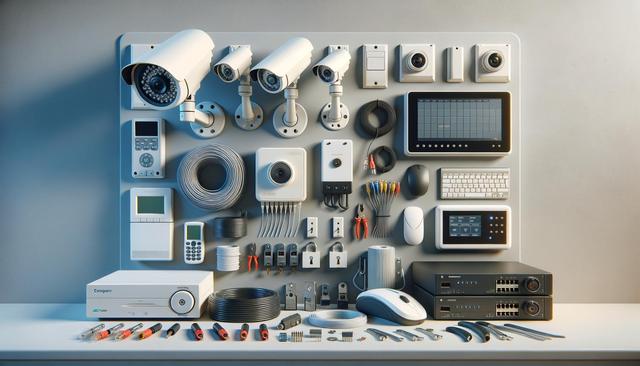Understanding the Role of a Security Systems Technician
Security systems technicians are responsible for installing, maintaining, and troubleshooting a variety of security devices. These include alarm systems, surveillance equipment, access control systems, and intercoms. With the growing reliance on smart technology, technicians must also be proficient in digital systems, including a Wireless Security Camera System with Remote Viewing, which allows users to monitor their properties from any location. In this role, professionals work with both wired and wireless setups, ensuring that all components function optimally and are configured according to client requirements. The demand for skilled technicians continues to rise, especially as more homeowners and businesses seek reliable security solutions like a Wireless Camera for Home.
Technicians often work in dynamic environments, ranging from residential neighborhoods to commercial buildings and public institutions. Their day-to-day responsibilities may include:
- Installing surveillance and alarm systems
- Testing and troubleshooting signal transmission issues
- Upgrading outdated systems
- Educating clients on system operation and maintenance
Given the wide range of technologies and configurations, this profession requires a combination of technical skills, attention to detail, and customer service capabilities.
Training and Educational Pathways
To become a security systems technician, formal training is typically required. Many professionals start with a certificate or diploma program in electronics, security technology, or a related field. These programs often include courses on basic electrical theory, digital systems, networking, and hands-on experience with current security technologies. Understanding how to set up and manage a Wireless Security Camera System with Remote Viewing is a common part of these curriculums.
In addition to academic learning, on-the-job training is essential. Apprenticeships or entry-level positions under experienced technicians allow newcomers to build practical skills. Depending on the region, certifications may also be required. These credentials demonstrate competence and can be a deciding factor for employers or clients looking to hire for installations of Security Cameras in {city}.
Key skills developed through training include:
- Reading and interpreting technical drawings
- Installing and configuring wireless and wired systems
- Understanding network protocols
- Complying with safety and building codes
Ongoing education is also important, as technology evolves rapidly. Regular updates in training ensure technicians remain adept at handling the latest tools and systems, such as a Best Cellular Security Camera.
Technical Skills and Tools of the Trade
Security systems technicians rely on a wide array of tools and technical knowledge to perform their duties. Common tools include drills, cable testers, voltage meters, and programming software. In the context of modern systems, familiarity with mobile apps and cloud interfaces is equally important, especially when working with a Wireless Camera for Home that integrates with smartphone notifications and remote access platforms.
Understanding connectivity options is crucial, particularly regarding wireless systems that depend on stable internet or cellular networks. For instance, a Best Cellular Security Camera needs to maintain a strong signal to ensure continuous monitoring and notifications. Technicians must assess signal strength, optimize camera placement, and ensure encryption protocols are in place for data security.
Moreover, integration with other smart home or business systems is becoming common. Technicians may be expected to link security systems with lighting controls, voice assistants, or automation hubs. This requires knowledge of various platforms and compatibility standards.
Work Environments and Career Opportunities
Security systems technicians can find employment in many sectors. Some work for specialized security firms, while others join construction or electrical companies. Freelancing or starting a small business is also a viable option for experienced professionals. The installation of Security Cameras in {city} is often in high demand, especially in urban areas with growing concerns about safety and property protection.
Opportunities also exist in public sector roles, such as working with law enforcement agencies, schools, or municipal buildings. These positions may involve maintaining large-scale surveillance networks and ensuring compliance with regulations. With the increasing use of cloud-based and remote-access systems, technicians who are comfortable with IT and networking will find themselves particularly well-positioned in the job market.
Career progression may involve moving into roles such as project manager, system designer, or technical trainer. As experience grows, technicians may also specialize in specific areas, such as CCTV, biometric access control, or high-security installations.
Staying Updated in a Rapidly Evolving Industry
The security industry continues to evolve, driven by technological advancements and changing consumer expectations. A Wireless Security Camera System with Remote Viewing is now standard in many new installations, and technicians must stay informed about new models, software updates, and cybersecurity practices. Subscribing to trade publications, attending workshops, and earning additional certifications are all ways to stay competitive.
As smart homes become more prevalent, understanding how systems like a Wireless Camera for Home integrate with other technologies is critical. This includes knowledge of mobile applications, voice assistant integration, and multi-platform compatibility. Furthermore, with the growing adoption of devices like a Best Cellular Security Camera, technicians must also be aware of cellular data limits, SIM configurations, and carrier compatibility.
Remaining up to date not only ensures better service delivery but also builds trust with clients. As more people invest in Security Cameras in {city}, they look for knowledgeable professionals who can recommend, install, and maintain systems effectively and securely.
Conclusion: Building a Future in Security Technology
Becoming a security systems technician offers a promising and rewarding career path for individuals with a passion for technology and a commitment to safety. With the right training and a continuous learning mindset, technicians can thrive in a variety of work environments and meet the growing demand for advanced security solutions. Whether configuring a Wireless Camera for Home or setting up a Best Cellular Security Camera for remote locations, skilled technicians play a vital role in modern property protection. For those considering this profession, the combination of technical knowledge, problem-solving skills, and customer interaction makes it a dynamic and impactful career choice.




Leave a Reply